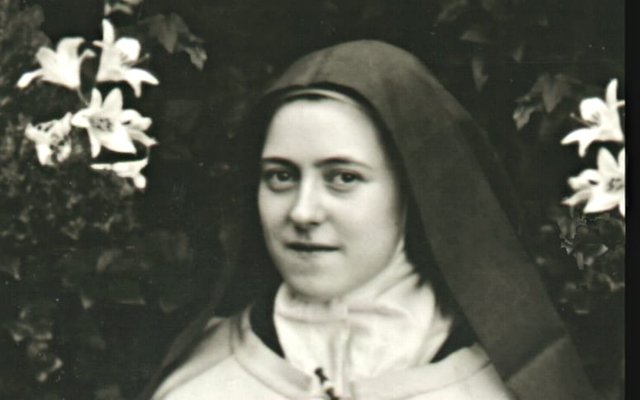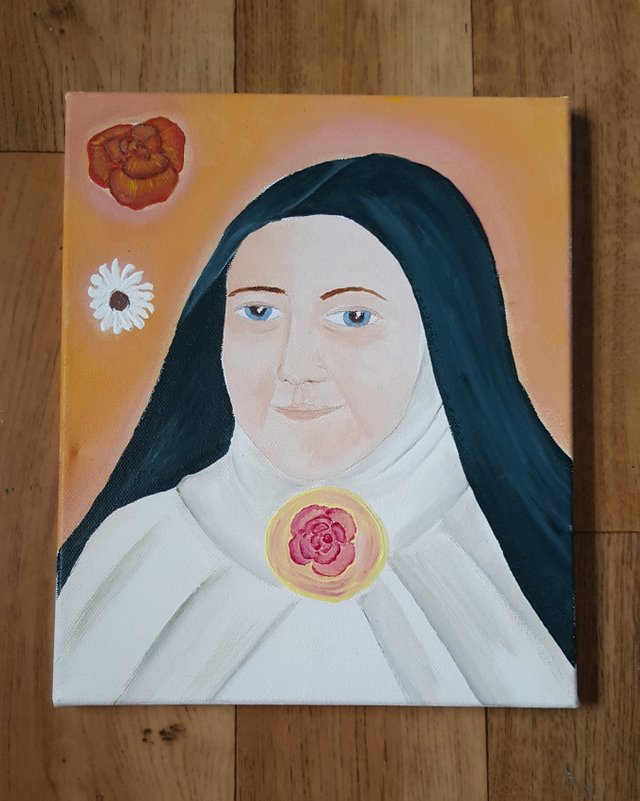
Today is the birthday of Thérèse of Lisieux (also known as ‘The Little Flower’). Thérèse is a wonderful soul who is very dear to my heart. She was a Carmelite nun who lived in Normandy, northern France, during the late nineteenth century. She was born on January 2nd 1873 in a small town called Alençon, and died on September 30th 1897 in her convent at Lisieux.
Like many spiritual seekers, Thérèse wrestled with her own faults and shortcomings. She worried that she had a tendency towards vanity which could lead her away from her love for God. Throughout her life, she also endured a litany of illnesses, and regarded these as ‘trials of faith’ that would ultimately strengthen her vocation. Tuberculosis claimed Thérèse’s life when she was twenty-four years old. However, her incredible spiritual understandings have survived because she began to write about them a couple of years before her death at the request of her sister Pauline, who was then Prioress of their convent and had taken the name Mother Agnes of Jesus. Thérèse’s writings were edited and assembled into her autobiography, Story of a Soul.
Thérèse has become well-known for her path of The Little Way: a path of spiritual purity, surrender and trust. One of the many ways in which she expressed her devotion to living with the innocence of a child was through the name she took upon entering religious life: Sister Thérèse of the Child Jesus and the Holy Face. Her humility is evident throughout her autobiography, as this passage demonstrates:
If a piece of canvas painted on by an artist could think and speak, it certainly would not complain at being constantly touched and retouched by the brush, and would not envy the lot of that instrument, for it would realise it was not to the brush but to the artists using it that it owed the beauty with which it was clothed. The brush, too, would not be able to boast of the masterpiece created with it, as it knows that artists are not at a loss; they play with difficulties, and are pleased to choose at times weak and defective instruments.
My dear Mother, I am a little brush that Jesus has chosen in order to paint His own image in the souls you entrusted to my care. An artist doesn’t use only one brush, but needs at least two; the first is the more useful and with it he applies the general tints and covers the canvas entirely in a very short time; the other, the smaller one, he uses for details.

Much emphasis has been placed on Thérèse’s gentleness, simplicity, and childlike nature (with good reason, of course, because she demonstrates these characteristics very strongly). However, her autobiography reveals that she was unafraid to be strong when the occasion required it.
‘I told you, dear Mother, that I had learned very much when I was teaching others. I saw first of all that all souls have very much the same struggles to fight, but they differ so much from each other in other aspects that I have no trouble in understanding what Father Pichon was saying: “There are really more differences among souls than there are among faces.” It is impossible to act with all in the same manner. With certain souls, I feel I must make myself little, not fearing to humble myself by admitting my own struggles and defects; seeing I have the same weaknesses as they, my little Sisters in their turn admit their faults and rejoice because I understand them through experience. With others, on the contrary, I have seen that to do them any good I must be very firm and never go back on a decision once it has been made. To abase oneself would not then be humility, but weakness. God has given me the grace not to fear the battle; I must do my duty at all costs.’
One of The Little Flower’s most famous statements on the nature of souls – and how they are akin to flowers – speaks very deeply to my heart.
‘I understood how all the flowers He has created are beautiful, how the splendour of the rose and the whiteness of the Lily do not take away the perfume of the little violet or the delightful simplicity of the daisy. I understood that if all flowers wanted to be roses, nature would lose her springtime beauty, and the fields would no longer be decked out with little wild flowers.’
The flourishing friendship between Thérèse and Vosloo is honestly one of the sweetest things I've ever witnessed, and I can't wait to bring her in as a guest for the 'Flipping the Pyramid' video in eight days' time. 😊 They might seem like an unlikely duo at first glance – he was an Atlantean High Priest, she was a young nun who lived a very quiet life – but they have been drawn together because they both place a huge emphasis on humility, trust, and the maintenance of a childlike heart.
I had a subtle sense of their connection beginning after I made my video on Thérèse in December. Vosloo was around me at that point, but he was being as unobtrusive as possible. Throughout the duration of my series on female Christian mystics, he had a very chivalrous air about him: insisting that this was a case of 'ladies first', and there was no need for me to worry about him until Thérèse, Teresa, Hildegard and Mary Magdalene had all had their say. ❤️
When Thérèse began to share her wisdom on how souls are akin to flowers – with a small, delicate daisy being every bit as precious, in the eyes of God, as a huge, dramatic rose – I knew that Vosloo was deeply moved by these words. He told me later that Thérèse had very elegantly described the core concept of equality between all souls that is so central to his own work. He asked her whether she would appear in the first instalment of his series with him ... and I had a sense of him being deeply honoured when she agreed. From what I've been sensing, these two have become firm friends since then! ☀️🌹
This is the first I have ever read about Thérèse of Lisieux. It's a pity she died so young, yet wonderful that she wrote so much down before that happened. For one so young, she was very wise and insightful.
Downvoting a post can decrease pending rewards and make it less visible. Common reasons:
Submit
She died young what to expect from a girlfriend at that time? Small chance it was her own free will to be a nun. She has a friendly face... I hope she was simple and the simplicity made her life easier.
Downvoting a post can decrease pending rewards and make it less visible. Common reasons:
Submit
Fascinating Tribute indeed!
This post has been appreciated and featured in daily quality content rewards. Keep up the good work.
Downvoting a post can decrease pending rewards and make it less visible. Common reasons:
Submit
Congratulations @aislingcronin! You have completed the following achievement on the Steem blockchain and have been rewarded with new badge(s) :
You can view your badges on your Steem Board and compare to others on the Steem Ranking
If you no longer want to receive notifications, reply to this comment with the word
STOPVote for @Steemitboard as a witness to get one more award and increased upvotes!
Downvoting a post can decrease pending rewards and make it less visible. Common reasons:
Submit